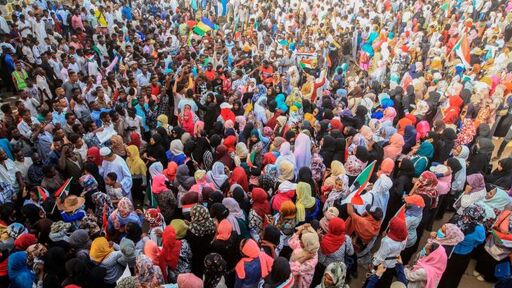This is actually rewriting history.
The Philippines had multiple militant movements but notably the Reform the Armed Forces which had orchestrated and abandoned a coup that had popular support kicking off the protest movement.
Sudan was a military coup that overthrew bashir and then massacred protestors and was actually backed by American OSI NGOs.
Algiers street protests were illegal and they combined general strikes with police clashes and riots even though they were subjected to mass arrests.
For Ghandi MLK jr and others mentioned there were armed militant groups adding pressure. My take away is you need both approaches.
Without demonstrating the ability to defend your nonviolent protest with devastating results it just gets crushed. If you are militant with no populist public movement backing your ideals you get labeled as terrorists and assinated by the feds.
are 2x more likely
Meaning, there can be instances where it’s true or not true.
66% of the time it works every time.
This is a really common misunderstanding of how nonviolent movements actually work, and frankly gets the causality backwards.
You’re right that successful movements often have both violent and nonviolent wings - but the nonviolent components don’t succeed because of the violent ones. They succeed despite them. The research is pretty clear on this: nonviolent campaigns are actually more likely to achieve their goals than violent ones, and they’re more likely to lead to stable democratic outcomes.
Nonviolent movements get labeled as extremist precisely when they’re associated with violence, not when they’re separate from it. The Civil Rights Movement’s greatest victories came when they maintained strict nonviolent discipline - Birmingham, Selma, the March on Washington. Every time violence entered the picture, it gave opponents ammunition to dismiss the entire movement.
The “good cop/bad cop” theory sounds intuitive but doesn’t hold up to scrutiny. What actually makes nonviolent resistance effective is mass participation, strategic planning, and moral leverage - not the threat of violence lurking in the background.
Okay but who’s the one defining a protest as violent? You get enough people together and you’re going to have some aseholes that damage property but are the minority. If chocolate can have 5% bugs, then protests should be able to have 5% violence and still be called peaceful.
Or heck, if people react when police instigate, should that be called a violent protest?
Cops are great at making any protest violent.
Okay but who’s the one defining a protest as violent?
The same people who write the history books. History is written by the winners, and when they write those books the protests that led to them winning are written up as being non-violent. It’s like “terrorists” vs. “freedom fighters”. If they succeed, they get to write the history books and they’re freedom fighters. If they lose, the other side writes the history books and they’re terrorists.
Is this why the opposition always tries to escalate the peaceful movement into a violent one?
No, it’s because the opposition is the establishment, and violence is a tool the establishment uses to… well, stay established.
Tell that to Hong Kong demonstrators on June 16, 2019, estimated by organizers at 2 million people marching. Hong Kong had a population of 7.5 million at the time.
Sure there was violence both before and after that protest, but mostly caused by violent crackdown by police.
But did it fail because there was violence or was violence a sign of stronger opposition? Causation vs correlation and all that.
Maybe they needed 3.5% of China? Since the repression was imposed from outside of the city its happening in a larger context than just the local demographics.
Yeah it seems to be the case as China didn’t respect the deal it made with UK to leave Hong Kong autonomous. If 3.5% of China did that it would most likely be a blood bath, be it a violent or non-violent protest.
my fucking ass 👅🥾
Bolsheviks, Stonewall riots, suffragettes, all famously peaceful movements that got their rights by staying on their knees and asking nicely.
Those are successful, yes. But then you have Arbenz’s Guatamala and the FARC in Columbia and the Tamil Tigers in Sri Lanka and democratic revolts in Hong Kong and Kashmir and the French Revolution and the Polish Resistance and the failures of socialist revolts across Africa and the Middle East.
I think part of the problem is how we define “successful”. Because it’s easy to see how the Spanish Anarchists failed to defeat Franco. Meanwhile, we largely consider the Civil Rights Era in the United States a success, despite many of its leaders being assassinated and its efforts quashed and undo under the Nixon/Reagan Era.
Militant insurgencies end when they are crushed by police/military. Peaceful protests don’t “fail” nearly so dramatically, they just fade away.
Psst, just a friendly reminder: it’s Colombia with two O’s and no U :) just a little pet peeve of mine.
democratic revolts in Hong Kong LOL you mean the CIA paid failed attempt at destabilisation?
Hong Kong residents have been demanding democratic reforms since British colonial days. A shame Americans only seem to care when protesters start waving MAGA flags. But this has been a failed campaign going on 50 years easy.
Y’all are out in full force today, huh
EDIT: since it seems like it needs clarification, the person I replied to was being sarcastic, the Bolsheviks obviously didn’t win without violence…
well where the hell could I go
Outside and touch grass? Where I am it’s beautiful and sunny out. Go for a run.
Outside and touch grass?
Wait till this guy finds out about cell phones
I just came indoors
To be fair it would be illegal to do so outdoors.
literally 1984 😔
How does the boot taste?
1 to 100 with a lot of you isn’t it?
How about just a healthy life balance?
I don’t think boot counts as 1 of your 5 a day honestly
You must be a riot at parties.
Countering the astroturfed “take it up the ass and do nothing useful campaign”? Why would anyone do that?
deleted by creator
Well that’s total bs, in Greece there’s been dozens of non-violent protests far exceeding 3.5% that have failed spectacularly.
Non-violent protests still need to come with a credible threat of becoming violent if the protesters’ safety is being attacked or if their human rights are compromised.
It’s a social contract basically: we will be peaceful as long as you allow us to remain peaceful.
Yes, basically the individual gives up their sovereign monopoly of violence to the state in exchange for protection and representation through the constitution. Break that contract and people have the moral right to oppose “legal” violence carried out through a dictatorship.
George Floyd protests had more than that (closer to 8%) and they didn’t really change anything.
Most of that I put on our ineffectual Democratic leadership who are supposed to represent the people. We had a mandate of millions and I don’t remember a single, actual dramatic effort to reshape policy by our elected leaders.
At that time, many people still believed Democrats were actually the opposition group to conservative fascism, and not the checked-out wine-mom getting alimony checks every month from the right.
Considering the UK’s biggest export is independence days, it’s kind of hard to think that all of those were solved through non violent means.
I have never known a North American protest to succeed at anything in my lifetime.
General strikes accomplish a fuck of a lot more in a shorter amount of time. When the owners of the administration can’t get their poptarts to the stores to be sold, the bank calls their loans and shit gets real.
Didn’t BLM 2020 protests have over 3.5%? I don’t think they accomplished much except put pressure to prosecute Chauvin. Like literally just that one guy.
I wanted to make an ironic, exaggerated comment here, but irony doesn’t really work when it is 100% in line with what these people would actually say.
Change is so slow because this country has managed to form and propogate such a thoroughly oppressive system, that to call it out is to only reinforce what the people have been taught since day one.
These “freedom people” want their privilege so bad that they are willing to keep a monarch/oligarch in office who will perpetuate an oppressive system under the guise of ignorance.
600k Australians protested against the Iraq war in 2003.
The population was about 20m so 3.5% of that is 700k. So if another 100k had joined then the protest would have succeeded?
No, if another 100k Australians had come out and then kept protesting day in day out for weeks/months they would have got the aus government to back down and not support the war.
This refers to Chenoweth’s research, and I’m somewhat familiar with their work. I think it’s good to clarify what non-violent means to them, as it’s non-obvious. For example, are economic boycotts violence? They harm businesses and keep food of the tables of workers. I don’t think that’s violence, but some people do, and what really matters here is what Chenoweth thinks violence is, and what they mean when they say “nonviolent tactics are more effective”.
At the end of “civil resistance: what everyone needs to know”, Chenoweth lists a number of campaigns which they’ve marked as violent/nonviolent and successful/unsuccessful. Let’s look at them and the tactics employed tonfigure out what exactly Chenoweth is advocating for. Please do not read this as a condemnation of their work, or of the protests that follow. This is just an investigation into what “nonviolence” means to Chenoweth.
Euromaidan: successful, nonviolent. In these protests, protestors threw molotov cocktails and bricks and at the police. I remember seeing a video of an apc getting absolutely melted by 10 or so molotovs cocktails.
The anti-Pinochet campaign: successful, nonviolent. This involved at least one attempt on Pinochet’s life.
Gwangju uprising in South Korea: unsuccessful, nonviolent. Car plowed into police officers, 4 dead.
Anti-Duvalier campaign in Haiti: successful, nonviolent. Destruction of government offices.
To summarize, here’s some means that are included in Chenoweth’s research:
- throwing bricks at the police
- throwing molotov cocktails at the police
- assassination attempts
- driving a car into police officers
- destroying government offices
The point here is not that these protests were wrong, they weren’t. The point is that they employed violent tactics in the face of state violence. Self-defense is not violence, and this article completely ignores this context, and heavily and knowingly implies that sitting in a circle and singing kumbaya is the way to beat oppression. It isn’t.
What does Chenoweth consider is violent?
Where’s the line where she would classify your movement as violent (and therefore likely to fail)?
If I have to be completely honest with you, and this is an indictment of their research, it seems heavily dependent on what the protest is for or against.
What about the arab spring?
They consider it non-violent.
Well… ok… then let’s do the “NONVIOLENT” protests and stop doing these sit ins.
I mean do they consider it a success?
there has to be a big ass asterisk on his post. generally things like the civil rights movement got partially undone and then success can be nebulous since even in a movement there are subset of goals that might not have been achieved















